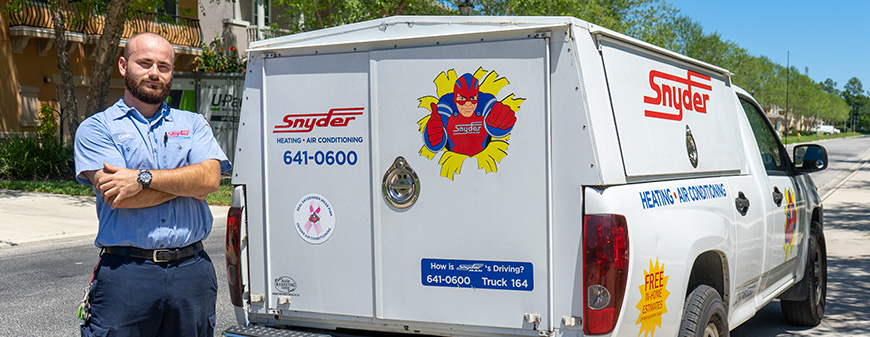
You just graduated from a refrigeration training program and are ready to work. Can you picture it already?
- Paying service calls to homes and businesses
- Inspecting and testing their faulty HVAC systems
- Troubleshooting HVAC problems to determine what’s wrong
- Discussing necessary repairs or replacements of components or even entire systems
Hold on—you’ll have to sell parts and equipment as an HVAC tech? Yes. HVAC sales can be part of the job.[1]
If you don’t have much experience in this area, don’t worry. We have you covered when it comes to selling to the majority of the market: Baby boomers and millennials.
Check out the tips below for what to know about these customers’ purchasing preferences and this important step of any HVAC service call.
Why It’s Important to Know Your HVAC Market
A customer’s journey to purchasing a product typically starts with a problem that first arose when they first become aware of the issue.[2] This is usually when you get the call from them about a broken-down furnace, for instance.
Get Started on the Path to a New Career
Fill out our form to learn how we can help you change your life.
Solving your customers’ problems is the key to selling them HVAC equipment. But they have to want your specific solution, not another contractor’s. And this is where some sales know-how can come in handy.[3]
What factors can generally persuade customers to purchase big ticket items like HVAC units?
Cost and value are two of the major ones. Value should be greater than price, and the unit must be within the customer’s financial reach.[4]
Wealth and purchasing power tends to vary by demographic. As the two largest living generations, Baby Boomers and Millennials will likely account for most of your customers—and they’re on opposite ends of the wealth spectrum.[5][6] This means you’ll need a different approach when selling to them.
HVAC Sales Tips for Baby Boomer and Millennial Customers

Selling HVAC to Baby Boomers
Born between 1946 and 1964, Baby Boomers are considered the wealthiest generation in history. They account for 55 percent of the country’s wealth and, in turn, purchasing power.
When you can afford to, why not be as comfortable as possible? Consider these customers when upselling premium HVAC products. Below are some suggestions for selling to them.
1. Link Product to an Aspirational Lifestyle
Baby boomers likely aren’t looking for the “lowest price” in town. Provide an excellent customer experience and a glimpse into how premium comfort could change their lives.
2. Highlight Product Benefits to Uncover Customer Desire
These customers can afford to turn their “wants” into “haves,” so show them what they should want. Discuss the benefits of premium HVAC equipment with them, whether near-silent operation, superior efficiency, next-level indoor air quality or others.
3. Offer Attractive Buying Options and ROI Details
This generation has been around for a long time; they’ve likely purchased their homes, cars and other major items through payment plans. They’re generally comfortable with the process. Make sure to let them know financing is available.
Like any experienced consumer, though, they’ll probably want to know what the return on their investment will be. Offer details about the energy savings or improved quality of life that could accompany the equipment.[7]
Selling HVAC to Millennials
The generation born between 1981 and 1996 is often referred to as Millennials. If you’re one of them, you may already know they tend to be cost conscious.
As mentioned above, Millennials have less wealth than earlier generations due to the rising cost of a college education, student loans and other economic conditions.[8][9]
Consequently, they can be thrifty: research from Blackhawk Engagement Solutions found that price is more important to 95 percent of Millennials than other factors, such as brand, store, product quality and availability.
At the same time, this generation is savvy when it comes to shopping, regularly comparing prices online to find the best buying experience and value.[10]
So, how should you sell HVAC systems to Millennial customers?
1. Know Where to Communicate
This generation came of age during the digital revolution and now heavily relies on the Internet when they’re deciding on a purchase.[11] After initially making HVAC equipment recommendations during the service call, follow up with Millennial customers online.
Emailing product information, reviews or comparisons could help persuade them to buy. After the sale, informative newsletters about common HVAC issues or system maintenance can help foster customer loyalty.[12]
2. Show Personal and Social Value
Millennial customers often care about the value of a product both to their lives and the world. A company’s impact on society and the environment can be important to them. Make sure to highlight not only how that high efficiency heat pump could make them more comfortable and save on utility bills but also cut down on carbon emissions.[13]
3. Be Helpful and Transparent
If they’re already going to price compare your offerings with the rest of the contractors around, then why not beat them to it? Let them know how your price compares to the rest and WHY.[14] Make your HVAC invoice as transparent as possible.
Explain your company’s track record of superior service and customer satisfaction. Back these claims up with testimonials and customer reviews. Customers check testimonials and reviews to decide on whether or not to trust a product, service or seller.[15]
Building Your HVAC Business
Sales are an important part of most HVAC service calls, as well as the revenue and longevity of an HVAC business. When formulating your sales strategy, keep the above considerations in mind. Customer purchasing power and preferences can differ by generation, so knowing your market is key to successful sales.
A thriving HVAC business, however, is not built on sales alone. Strong customer service skills can also help HVAC techs grow their customer base and support loyalty.
Additional Sources
[1] https://www.bls.gov/ooh/installation-maintenance-and-repair/heating-air-conditioning-and-refrigeration-mechanics-and-installers.htm#tab-2
[2] https://blog.hubspot.com/sales/what-is-the-buyers-journey
[3] https://www.achrnews.com/articles/140230-seven-secrets-hvac-contractors-need-to-know-for-selling-premium-comfort
[4] https://www.achrnews.com/articles/140230-seven-secrets-hvac-contractors-need-to-know-for-selling-premium-comfort
[5] https://www.cnbc.com/2018/05/22/that-30-trillion-great-wealth-transfer-is-a-myth.html
[6] https://www.federalreserve.gov/econres/feds/files/2018080pap.pdf
[7] https://www.achrnews.com/articles/140230-seven-secrets-hvac-contractors-need-to-know-for-selling-premium-comfort
[8] https://www.businessinsider.com/millennials-cost-of-living-compared-to-gen-x-baby-boomers-2018-5#millennials-have-to-pay-more-for-a-four-year-college-degree-and-are-left-with-higher-student-loan-debt-3
[9] https://www.pewsocialtrends.org/essay/millennial-life-how-young-adulthood-today-compares-with-prior-generations/
[10] https://blackhawknetwork.com/blackhawk-engagement-solutions-explores-millennials-shopping-habits/
[11] https://blackhawknetwork.com/blackhawk-engagement-solutions-explores-millennials-shopping-habits/
[12] https://www.entrepreneur.com/article/284249
[13] https://www.entrepreneur.com/article/284249
[14] https://www.entrepreneur.com/article/284249
[15] https://blog.hubspot.com/service/customer-reviews-testimonials
This blog has been labeled as archived as it may no longer contain the most up-to-date data. For a list of all current blog posts, please visit our blog homepage at https://www.rsi.edu/blog/

